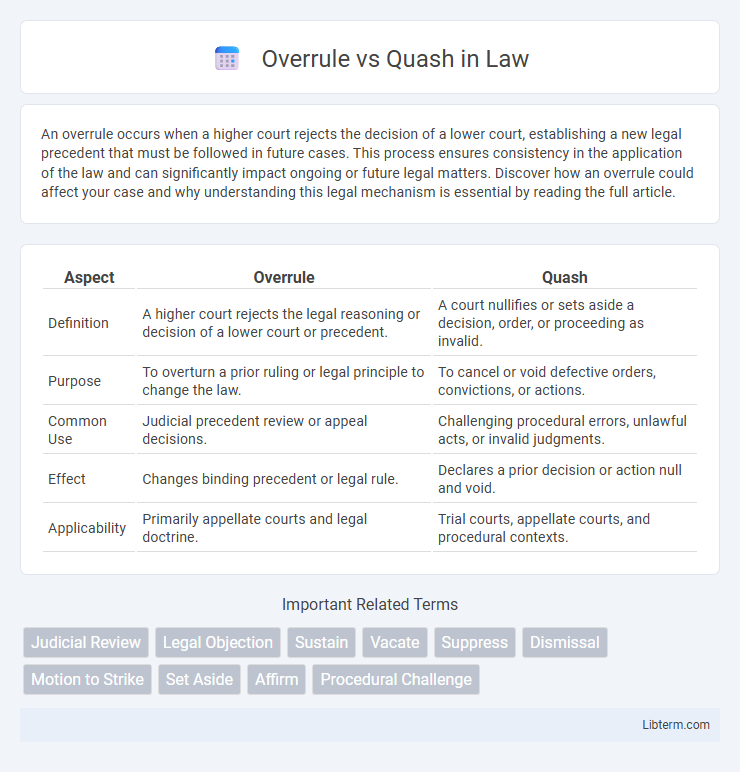An overrule occurs when a higher court rejects the decision of a lower court, establishing a new legal precedent that must be followed in future cases. This process ensures consistency in the application of the law and can significantly impact ongoing or future legal matters. Discover how an overrule could affect your case and why understanding this legal mechanism is essential by reading the full article.
Table of Comparison
| Aspect | Overrule | Quash |
|---|---|---|
| Definition | A higher court rejects the legal reasoning or decision of a lower court or precedent. | A court nullifies or sets aside a decision, order, or proceeding as invalid. |
| Purpose | To overturn a prior ruling or legal principle to change the law. | To cancel or void defective orders, convictions, or actions. |
| Common Use | Judicial precedent review or appeal decisions. | Challenging procedural errors, unlawful acts, or invalid judgments. |
| Effect | Changes binding precedent or legal rule. | Declares a prior decision or action null and void. |
| Applicability | Primarily appellate courts and legal doctrine. | Trial courts, appellate courts, and procedural contexts. |
Introduction to Legal Terms: Overrule vs Quash
Overrule refers to a higher court's decision to reject or reverse a previous ruling, impacting the legal precedent set by a lower court. Quash means to annul or void a legal proceeding or decision, often due to procedural errors or lack of jurisdiction. Understanding the distinction between overrule and quash is essential for navigating appellate and procedural law effectively.
Defining "Overrule" in Legal Context
In legal context, "overrule" refers to a higher court's action of rejecting or reversing a lower court's decision, often setting a new precedent. It signifies the authority of appellate courts to invalidate prior judgments or legal principles deemed incorrect or outdated. This mechanism ensures the evolution and uniformity of case law within the judicial system.
Understanding the Term "Quash
The term "quash" refers to the legal act of nullifying or setting aside a decision, order, or proceeding, typically by a higher court or authority, rendering it void and without effect. Unlike "overrule," which overturns a precedent or legal interpretation, quashing targets the validity of a specific judgment or procedural action. Understanding quash is crucial for recognizing how courts control procedural fairness and correct errors in legal processes.
Key Differences Between Overrule and Quash
Overrule refers to a higher court's rejection or reversal of a lower court's legal decision or precedent, effectively changing the interpretation of the law. Quash involves nullifying or setting aside a specific legal proceeding, order, or decision, typically due to procedural errors or lack of jurisdiction. The key difference lies in overruling affecting legal principles and precedents, while quashing targets the invalidation of particular actions or orders within a case.
When is a Decision Overruled?
A decision is overruled when a higher court or authority rejects and replaces the lower court's ruling due to errors in law or procedure. Overruling invalidates the previous judgment and establishes a new legal precedent, often altering the interpretation of the law. This differs from quashing, which simply nullifies the decision without setting a new precedent.
Situations Where Courts Quash Orders
Courts quash orders primarily when legal errors, jurisdictional issues, or procedural irregularities render the decisions invalid or unenforceable. Quashing voids the original order, often halting further proceedings until corrected, such as in cases of improper service or lack of authority. This contrasts with overruling, which typically applies to appellate courts reversing lower court decisions based on substantive legal interpretations.
Impact of Overruling vs Quashing on Legal Proceedings
Overruling a previous decision impacts legal proceedings by setting a new precedent that alters the interpretation or application of the law, influencing future cases and judicial reasoning. Quashing a decision nullifies the specific ruling due to errors or procedural issues, effectively erasing its legal effect without necessarily changing established legal principles. The impact of overruling is broader, affecting the legal landscape, while quashing primarily rectifies errors in individual cases.
Common Examples: Overrule vs Quash in Court Cases
Overrule occurs when an appellate court changes or reverses a lower court's ruling, such as overruling a defendant's objection to inadmissible evidence during trial. Quash refers to nullifying or voiding a previous legal decision or action, often seen when a higher court quashes a subpoena or removes a wrongful indictment. Common examples include an appellate court overruling a trial judge's evidentiary ruling versus a court quashing a warrant or motion due to procedural errors.
Legal Implications of Overruling and Quashing
Overruling a decision negates its legal authority and establishes a new precedent, fundamentally altering the interpretation or application of law in subsequent cases. Quashing a decision invalidates it due to procedural errors or jurisdictional issues, rendering the original judgment void without necessarily setting new legal guidelines. Understanding these distinctions is crucial for legal strategies, as overruling impacts future case law, while quashing primarily affects the outcome of the specific case.
Conclusion: Choosing the Right Legal Remedy
Choosing the right legal remedy between overrule and quash hinges on the case context and desired outcome. Overrule is appropriate when correcting judicial errors in precedent or legal reasoning, effectively reversing a prior decision. Quash is better suited for invalidating a specific legal proceeding or decision due to procedural defects or jurisdictional issues.
Overrule Infographic

 libterm.com
libterm.com